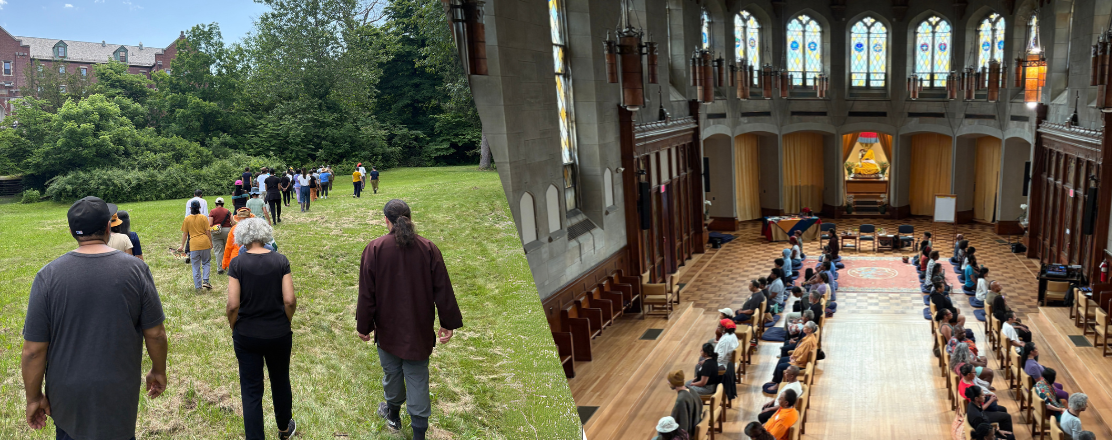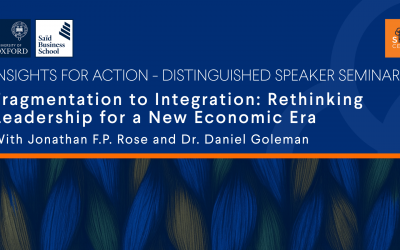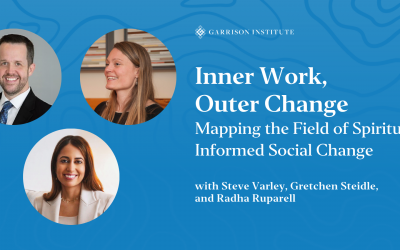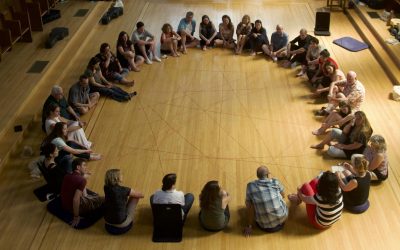What I found at Defiance as an Act of Love: A Retreat for BIPOC (Black, Indigenous, People of Color) — joy, safety, and a rhythm all our own
I sat in the meditation hall, bringing awareness to my in and out breath as the sunlight streamed in from the stained glass windows.
As the bell sounded and we began to walk around the meditation hall together in silence, I looked at the beautiful sangha that surrounded me and was overwhelmed by the amount of warmth, support — and most importantly, safety.
As I slowly walked and allowed for my feet to kiss the Earth as Zen Master Thích Nhất Hạnh taught us, my beautiful Black, Muslim, Latino, Asian, and trans siblings walked beside me and I felt us all walking — both in our own lived experiences but also, together.
My eyes welled up as I felt our collective breath and steps in a gentle rhythm together. It was a new feeling for me — to be in a space of healing where I felt like I could radically be myself.
As a Queer Asian woman, a kid of Vietnam War refugees, I have often felt alone in my experience living in America. Growing up in Texas, I knew I was the “other” but didn’t understand how deeply this was ingrained in my consciousness till I was an adult.
From my former white sister-in-law covering her nose and telling me I smelled after eating a meal with my parents to the deafening sounds of kids laughing at me while they pulled back their eyes when I was in grade school, these micro and macro forms of racism have stayed with me and it has been the work of my adult life to dig them out of my subconscious and let them go. To rewrite the narratives that I am not enough simply because of my racial background, my sexual identity, or my body size.
When I began my spiritual journey more than a decade ago, I often felt that spiritual communities — yoga and Buddhist communities — were ironically a mirror of my experience of the world I was trying to heal from. I was often the only person of color in those spaces and I saw how the insidious and violent nature of white supremacy would upend the communities I had invested in.
This was particularly hard to witness as the light of the truth shined on so many spiritual communities after the murder of George Floyd in 2020. Every day, more and more harm was exposed and brought to light, from sexual misconduct to physical abuse. The particular yoga studio I had invested many years in was part of the unraveling, as many of the teachers who I had admired were either involved in the racial targeting of Black people or knew of the harm that had been done and looked the other way. Silence in that space, I learned the hard way, was no longer a refuge, but violence.
It was shortly after that time that I decided to study exclusively with BIPOC teachers. Between then and now, I was lucky enough to discover Zen Master Thích Nhất Hạnh’s Plum Village community and one of his practice centers, Blue Cliff Monastery. As I immersed myself into a tradition that revered my Vietnamese identity instead of marginalizing it, I began discovering teachers in the tradition and became drawn to Kaira Jewel Lingo. It was then that I discovered she ran an online BIPOC sangha at the Garrison Institute with Dr. Marisela Gomez.
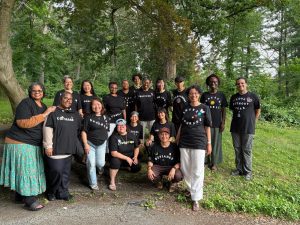 I remember the first time I attended this sangha online. Somehow within an hour, we were able to hold space for our heartbreak, practice mindfulness — and also somehow make time for joy. We supported each other in our unique lived experiences of the world, both on a personal and collective level. Never once did I feel the need to explain my experience, why I felt the way I did, never did I have to explain why I believed what I did, and how hard it was to live in the world we live in because of the identities I hold.
I remember the first time I attended this sangha online. Somehow within an hour, we were able to hold space for our heartbreak, practice mindfulness — and also somehow make time for joy. We supported each other in our unique lived experiences of the world, both on a personal and collective level. Never once did I feel the need to explain my experience, why I felt the way I did, never did I have to explain why I believed what I did, and how hard it was to live in the world we live in because of the identities I hold.
There was a quiet knowing — of each other, of our pain, of our world. Even if it was different, it was also the same. And we were all showing up in this space with the same hope: That this suffering could be healed, could be transformed.
It was in that moment that this hour on Thursdays became part of my schedule. It was in that moment that I jumped at every opportunity to learn more about the dharma — including joining Garrison Institute’s two-year fellowship that was born out of the group, the BIPOC Intergenerational Healing and Justice Fellowship (BIJaH).
So when all of this culminated at the Defiance as an Act of Love: A Retreat for BIPOC last month, my heart was overwhelmed. Under the guidance of my incredibly skillful and loving teachers, Kaira Jewel, Dr. Marisela Gomez, and Joe Reilly, I felt not only a new sense of safety in my spirit and body but an energy of liberation that I have been searching for my entire life.
A BIPOC-only sangha breaks the power dynamic that exists in our everyday lives — one in which white supremacy rules and dominates how we live, think, breathe. This is a radical act — a space where centuries worth of conditioning begin to unravel, and where we are allowed to simply be.
In a world that has been built on the backs of BIPOC folks and one where we continue to be demonized and dehumanized every day, this space to simply be is everything.
It is a gift. It is revolutionary. It is liberation.
Every day we began with a morning sit in the beautiful meditation hall and a mindful walk outside, followed by an incredible dharma talk from one of our teachers. We then met in our smaller groups — where I had the honor of co-facilitating the Asian sibling group — and ended the day with meals in silence and different evening activities, including a grief ceremony and a somatic movement experience called interplay.
On our last night at the retreat, we ended with a Be-In. It is a space for our community to come together and simply be in our joy — sharing songs, poems, whatever our hearts wanted. I have been to many Be-Ins at Blue Cliff before, it is a sweet experience rooted in the Plum Village tradition.
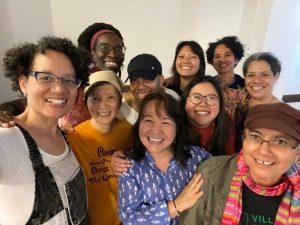
But this Be-In was extraordinary. It was powerful, funny and the most decolonized display of joy I have ever experienced in my life. As I sat on my cushion, I listened to:
A former Black pastor sing in honor of his mother;
A trans Asian sibling read a poem that woke me up and lit my heart on fire;
A Muslim sibling share a folk tale reminding us that God is near, even when we forget to believe; and
A Latino man lead us in a call-and-response in Spanish about tending to seeds we planted together.
And then we danced — from a blend of Afro-Brazilian, Sierra Leonean, and Caribbean led by one of my fellow BIJAH siblings to an all-around dance party that kicked off with the Cupid Shuffle.
To the right, to the right, to the right, to the right
To the left, to the left, to the left, to the left
Now kick, now kick, now kick, now kick
Now walk it by yourself, now walk it by yourself
(Let me see you do)
As we all danced and laughed in the meditation hall, I heard Dr. Marisela Gomez shout, “This is what liberation feels like!”
As I went to bed that night, my heart bursting with joy, my body lit up from being alive, her words stayed with me. And for the first time in years, I had hope that our world outside the walls of this retreat could be different.
It could be a place where not only does the Global Majority, but everyone, co-exists with love and respect, and we allow room for heartbreak and joy.
I will be forever grateful to my teachers, my BIJaH cohort, the staff at the Garrison Institute, particularly Monique Francis, for cultivating the Thursday online sangha, and to every single BIPOC retreat participant for showing up with such a beautiful and open heart those five days.
Because of you, I know I am no longer alone. I carry hope now — for our world, for our healing. Liberation is not just a dream. It’s already happening.
That is the biggest gift anyone could give.
So thank you.
And I’ll keep on dancing until we all meet again.
–
Kim Thai (she/her) is an interdisciplinary mindfulness writer and teacher. As an Emmy-award storyteller and a proud Queer kid of Vietnamese refugees, she has uplifted marginalized voices across different mediums for almost 20 years. Her personal essays on identity, healing and social justice have been published in New York Magazine’s The Cut, Newsweek, Buzzfeed and more. She is a certified yoga and meditation teacher and currently a student in Zen Master Thích Nhất Hạnh’s Plum Village Buddhist tradition, exploring how we can liberate ourselves from oppressive systems and release embodied trauma through mindfulness. She is currently working on a memoir/mindfulness book on how to reclaim power and joy in the world regardless of what identities you hold. You can follow her work by subscribing to her mindfulness newsletter Just One Breath, where she invites us to see how every moment is an opportunity to transform the world around us.

